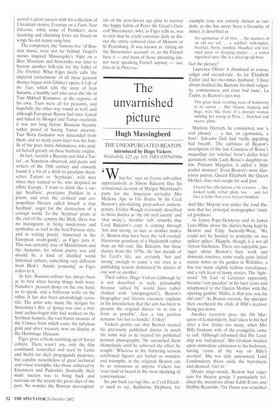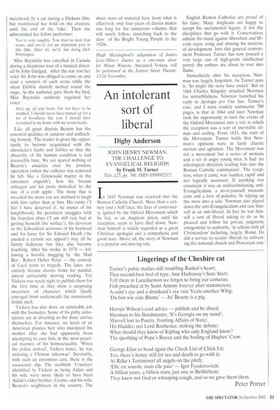The unvarnished picture
Hugh Massingberd
'THE UNEXPURGATED BEATON introduced by Hugo Vickers Weidenfeki, £25, pp. 418. ISBN 0297645994 W hat-ho,' says an Excess sub-editor appreciatively as Simon Balcairn files his sensational account of Margot Metroland's party for the American revivalist Mrs Melrose Ape in Vile Bodies by Sir Cecil Beaton's pin-sticking prep-school contemporary, Evelyn Waugh (variously described in these diaries as 'my old arch enemy' and 'that swine'). Another 'sub' remarks that Lord Balcairn's copy is coming through 'hot and strong, as nice as mother makes it'. Beaton may have been the 'self-created' Harrovian grandson of a blacksmith rather than an 8th earl, like Balcairn, but these diaries from the 1970s, the last decade of Sir Cecil's life, are certainly 'hot and strong' enough to cause a stir even in a publishing season dominated by diaries of one sort or another.
Their editor, Hugo Vickers (although he is not described as such, presumably because 'edited by' would have rather clashed with 'unexpurgated'), Beaton's biographer and literary executor, explains in his introduction that the aim has been to present the original diaries 'in as raw a form as possible'. Just a tiny portion remains 'too hot to handle'. Crikey!
Vickers points out that Beaton treated his previously published diaries in much the same way as he treated his published portrait photographs: 'He retouched them shamelessly until he achieved the effect he sought.' Whereas in the flattering version celebrated figures are hailed as wonders and triumphs, in the originals Beaton can be as venomous as anyone Vickers has 'ever read or heard in the most shocking of conversations'.
So, pin back yer lug'oles, as Cyril Fletcher used to say. Katharine Hepburn, for example (one not entirely chosen at random, as she has never been a favourite of mine), is described as
the egomaniac of all time the manners of an old sea salt ... a raddled, rash-ridden, freckled, burnt, mottled, bleached and wizened piece of decaying matter ... a rotten ingrained viper. She is a dried-up old boot.
Get the picture?
Laurence Olivier is dismissed as coarse, vulgar and second-rate. As for Elizabeth Taylor and her two-times husband, 'I have always loathed the Burtons for their vulgarity, commonness and crass bad taste'. La Taylor, to Beaton's eyes was
This great thick revolting mass of femininity in its rawest ... Her breasts, hanging and huge, were like those of a peasant woman suckling her young in Peru ... blotched and mauve, plum.
Marlene Dietrich, he considered, was 'a real phoney ... a liar, an egomaniac, a bore'. Salvador Dali had 'really appalling bad breath'. The cattiness of Beaton's description of the late Countess of Rosse's maquillage (or 'witches' brew') defies brief quotation, while Lady Rosse's daughter-inlaw, Princess Margaret, is called a 'little pocket monster'. Even Beaton's most illustrious patron, Queen Elizabeth the Queen Mother, does not escape his acid pen:
I found her affectations a bit tiresome ... She looked really rather plain, too ... and her face is fuller than ever, but yet wrinkled.
And Her Majesty was under the fond illusion that her principal iconographer 'exuded goodness'.
As James Pope-Hennessy said to James Lees-Mil= about the diaries being kept by Beaton and Eddy Sacicville-West, 'We could not be hoisted to posterity on two spikier spikes.' Happily, though, it is not all vicious bitchiness. There are enjoyable passages about Beaton's busy work and domestic routines, some really quite lyrical nature notes on his garden in Wiltshire, a few too many slightly tedious travelogues, and a rich feast of funny stories. The 'tightassed' 5th Earl of Leicester apparently became 'very peculiar' in his later years and telephoned to the Queen Mother with the opening gambit: 'Hullo, is that you, you fat old cow?' As Beaton records, the operator then overheard the click of HM's receiver being put down.
Another eccentric peer, the 8th Marquess of Londonderry, had taken to his bed after a few drinks too many, when Mrs Billy Graham, wife of the evangelist, came to call. Although informed that His Lordship was 'indisposed', Mrs Graham insisted upon immediate admission to his bedroom, having 'come all the way on Billy's account'. She was duly announced. Lord Londonderry threw aside the bed-sheets and shouted, 'Get in.'
Always stage-struck, Beaton had eager ears for theatre gossip. I particularly relished the anecdotes about Edith Evans and Debbie Reynolds. The Dame was scratched mercilessly by a cat during a Dickens film, but maintained her hold on the creature until the end of the 'take'. Then she admonished her fellow performer:
You're very naughty. You tried to steal that scene, and you're not an important part in this film. After all, we're not doing Dick Whittington.
Miss Reynolds was catcalled in Canada during a disastrous tour of a musical directed by John Gielgud. After the star lost her voice Sir John was obliged to come on and read a synopsis of each scene while the silent Debbie daintily twirled round the stage. As the audience gave them the bird, Miss Reynolds suddenly regained her voice:
Shut up, all you hums. I'm not here to he insulted. I should never have turned up for a lot of hoodlums like you. I should have remained in my home with my seven maids.
Like all great diarists Beaton has the essential qualities of candour and unflinching honesty. The reader is given the opportunity to become acquainted with the chronicler's faults and foibles so that the absurdity of the human condition is laid irresistibly bare. We are spared nothing of Beaton's anxieties over his prostate operation (when the catheter was removed he felt 'like a Griinewald martyr in the extremest anguish'), how his breasts enlarged and his penis shrivelled 'to the size of a crab apple'. The more that is revealed the more you are inclined to laugh with him rather than at him. His vanity ('I feel I have deserved it', he muses of his knighthood), his persistent struggles with his hopeless plays CI am still very bad at getting beneath the surface'), his devotion to the Edwardian actresses of his boyhood and his fancy for Sir Edward Heath (he exuded a certain sex appeal') may all be faintly ludicrous but they also become touching. After his stroke in 1974 — following a horrific mugging by 'the Mad Boy', Robert Heber Percy — the comedy of Cecil turns to tragedy. The later, not entirely literate diaries make for painful, almost unbearably moving reading. Yet Vickers was surely right to publish them for the first time as they show a surprising sweetness of character which finally emerged from underneath the notoriously brittle shell.
Vickers has also done an admirable job with the footnotes. Some of his pithy annotations are as diverting as the diary entries themselves. For instance, we learn of an American plastics heir who murdered his mother after she had apparently been attempting to cure him, in the most practical manner, of his homosexuality. 'When the police arrived', Vickers notes, 'he was ordering a Chinese takeaway'. Inevitably, with such an enormous cast, there is the occasional slip. The snobbish `Crawleys' identified by Vickers as being Aidan and his wife were more likely to have been Aidan's elder brother, Cosmo, and his wife, Beaton's neighbours in the country. The
sheer mass of material here from what is effectively only four years of diaries makes one long for the numerous volumes that will surely follow, stretching back to the days of the Bright Young People in the 1920s.
Hugh Massingberd's adaptation of James Lees-Milne's diaries as a one-man show for Moray Watson, Ancestral Voices, will be peiformed at the Jermyn Street Theatre, 12-16 November.



















































































 Previous page
Previous page